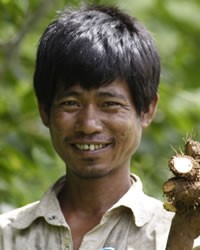Our Vision
To see God glorified through an abundance of Christ followers within every people group.
Our Mission
Joshua Project highlights peoples and places with the least access or response to the gospel so the Body of Christ can prioritize its prayer and mission efforts.
About Us
Followers of Jesus around the world are commissioned to “go make disciples of all nations” (Matthew 28:19). Christians may perceive they are fulfilling Jesus’s commission because churches are thriving in almost every country. The word translated as “nations,” however, is “ethne” in the original Greek, which can equate to “ethnic groups.” Christians are called to make disciples of all ethnic groups, not just modern nation states, because God desires his acts of love, hope, and salvation to extend to all peoples of the world.
Joshua Project highlights the peoples and places with the least access or response to the gospel.
Who are these ethnic groups? As long as they remain unknown and hidden, followers of Christ would be seeking to obey Jesus’s Great Commission like someone traveling without a map or destination. Joshua Project provides a destination map for the Great Commission by highlighting peoples and places with the least access or response to the gospel, empowering the Body of Christ to prioritize its prayer and mission efforts.
We provide a comprehensive people group database of the world, and we track what God is doing among these peoples, so we can assist the Global Church in the vision of seeing God glorified through an abundance of Christ followers within every people group.
Our History
Joshua Project was birthed in 1995 out of a world evangelism initiative called the AD2000 and Beyond Movement which had four key founders from four different countries (Argentina, Malaysia, China, and India). Luis Bush, from Argentina, was the main influencer in founding Joshua Project.
Joshua Project provides a comprehensive people group database of the world.
At the time, there were various people group lists being formulated without universal acceptance. To inspire the global church in working toward the vision of a "church for every people and the gospel for every person", an initial Joshua Project list of 1,700 largest unreached people groups was agreed upon by key global leaders and creators of various people group lists.
Many missionaries were inspired to pray and labor among these largest unreached people groups, particularly in the 10/40 window, during that time. Joshua Project continued after the AD2000 and Beyond initiative ended, expanding its list to include all people groups, with a special emphasis remaining on unreached peoples.
Joshua Project seeks to inspire prayer and ministry among unreached people groups.
Joshua Project was a ministry associated with the U.S. Center for World Mission (now known as Frontier Ventures) from 2005-2023. In 2024, Joshua Project was established as a non-profit organization within the United States.
Our Beliefs
Joshua Project believes God has uniquely created and orchestrated the peoples, languages, and cultures of the world to reflect his own creativity and beauty in this world. Joshua Project provides dignity to all peoples by acknowledging their existence and value, while also recognizing that humanity can only fulfill its purpose by knowing and being reconciled to its Creator. We are followers of Jesus who help likeminded people join God’s story of seeing his message of hope and reconciliation through Jesus extend to all people groups of the world. We adhere to the following statements of faith:
Our Values
- Service - We delight in serving churches, ministries, and individuals with information to help them take prioritized next steps in missions.
- Generosity - We are committed to steward people group information with a radical generosity. We believe this resource is crucial to the church’s obedience to the Great Commission and offer the majority of that resource for free.
- Neutrality - We are evangelical Christians with a people group focus, but we otherwise seek to be neutral in denominational and missiological particulars.
- Resourceful - We seek to honor God by being good stewards of resources. Joshua Project is far more impactful than what seems possible for our limited budget and staff.
- Diligence - We love what we do and work hard to do all things as unto the Lord (Colossians 3:17).
- Having a people group lens - We understand the Global Church has many responsibilities, but Joshua Project advocates for the Body of Christ’s involvement in intercession and mission work among unreached people groups who have had little access or responsiveness to the gospel.
- Having a responsiveness to the field - Joshua Project relies on feedback from the field to accurately display people’s identities and their status of Christian witness. We seek to display the local realities and viewpoints of people’s identities and responsiveness to the gospel.
- Maintaining data integrity - At tension with the prior value, Joshua Project seeks to maintain integrity in our data, which means we work diligently to provide updates on population counts and take seriously the level of reputability of field data sources. We also compare data with other sources and seek to reconcile disparities.
- Obtaining enough demographic data on all people groups to catalyze prayer and ministry among them - We are not exhaustive in our understanding and presentation of information on particular people groups or the details of mission activity among them. Instead, we seek to create a comprehensive list of people groups that defines the mission field as accurately and adequately as possible to help the Body of Christ prioritize their prayer and mission activity.
More questions?
Check out answers to Frequently Asked Questions or contact us.




